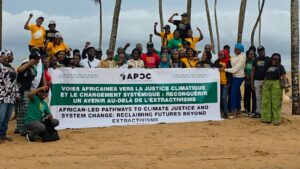
By Edu Abade
No fewer than 100 representatives from 20 African countries, including grassroots communities, indigenous peoples, farmers, youth, women and civil society groups have demanded an urgent end to extractivism-a practice that has allowed the Global North to exploit Africa.
They made the demand at the second African People’s Counter-COP (APCC) summit with the theme: “African-Led Pathways to Climate Justice and System Change: Reclaiming Futures Beyond Extractivism,” which was held recently in the Republic of Benin.
 The African Climate Justice Collective (ACJC), which organized the gathering, used the platform to directly challenge the United Nations Framework Convention on Climate Change (UNFCCC) Conference of Parties (COP). They declared that the UNFCCC process has been co-opted by capitalism and the Global North, continuously sidelining African voices and exacerbating the climate crisis.
The African Climate Justice Collective (ACJC), which organized the gathering, used the platform to directly challenge the United Nations Framework Convention on Climate Change (UNFCCC) Conference of Parties (COP). They declared that the UNFCCC process has been co-opted by capitalism and the Global North, continuously sidelining African voices and exacerbating the climate crisis.
Coordinator of the ACJC, Rumbidzai Mpahlo, said, “The climate crisis ravaging Africa is not our fault; it is a reflection of the debt owed by the Global North. While we contribute minimal emissions, we endure maximum suffering. This Declaration represents our unified demand to dismantle exploitative power and reclaim our future ahead of COP30.”
From the drought-stricken farmlands of the Sahel to the eroding coastlines of Ouidah in the Republic of Benin, the message from the APCC was clear: the era of extraction and exploitation must end.
On his part, Director of Campaigns and Administration at the Community Development Advocacy Foundation (CODAF), Maimoni Ubrei-Joe, said, “Our struggle is not just against carbon emissions but against a system that extracts from Africa without accountability. We are rejecting the illusion that corporate-led ‘green’ solutions can save us. What we need is a people-driven transition that restores power to communities, not profit to corporations.”
In his intervention, Khadija Abdulahi of Save Lamu in Kenya, stressed that these demands are rooted in lived experiences, adding, “In Lamu, we’ve seen how oil and gas projects threaten our homes, our sea, and our heritage,” she said. “Women who depend on fishing and farming are being pushed to the margins while corporations’ profit. Our message is clear: no project on our land without our consent-and no future built on fossil fuels.”
Also, Executive Director of Muyisi Environment Gabon, Ladislas Désiré Ndembet, linked extractivism to the erosion of democracy itself, saying, “When foreign companies dictate our energy policies, our sovereignty is compromised,” he said. “Ending fossil fuel extraction is not just about protecting the planet; it’s about reclaiming our political and economic independence.”
Describing their demands as urgent and non-negotiable, the group argued that at the heart of the APCC’s declaration is a bold framework for systemic change that redefines what genuine climate justice means for Africa and the Global South.
In a communiqué made available to journalists by Benson Dotun Fasanya of the ACJC, countries in the Global North must pay climate reparations, remediation and compensation-not as loans, but as grants.
“All exploration and production must be halted immediately. Africa’s future must be powered by grassroots-led, socially owned renewable energy systems that serve local communities first. There should be an end to dangerous distractions: The APCC firmly rejects false solutions that commodify nature and deepen inequality. These include REDD+, carbon trading, Net Zero policies, waste-to-energy projects and all forms of geo-engineering.
“We demand the Right to Say No! There must be free, prior and informed consent: Every community must have the legal and moral right to reject projects that threaten their land, lives, and culture. The ratification and enforcement of Free, Prior, and Informed Consent (FPIC) is non-negotiable,” the communiqué reads.
The Counter-COP’s message is unmistakable: Africa’s fight for climate justice is not a plea for aid, but a demand for reparations and transformation.
As Jerry Todjro TCHAIKPE puts it, “We are no longer asking to be heard — we are building the alternative.”
They also demanded that global funds like the Green Climate Fund (GCF), Adaptation Fund, and Loss and Damage Fund must be adequately resourced, transparent, and directly accessible to communities most affected by climate impacts-not controlled by profit-driven multilateral banks.
On promotion of food sovereignty, the group advocated that African governments must reform land laws to benefit local people, prioritize indigenous food systems, and invest at least $5 billion annually in peasant agro-ecology.
They restated that Africa is not the world’s dumping ground and as such governments should adopt zero-waste policies and reject the influx of obsolete technology, textiles and plastic waste from the Global North. They should prioritize Africa’s energy sovereignty and support a people-led transition to renewable energy, benefiting local communities, women, youth, and indigenous peoples.
“Climate Refugees must be protected. Governments and international bodies must provide urgent adaptation and resilience funding to ensure people can remain safely in their communities or relocate with dignity.
“As the world prepares for COP30 in Belém, Brazil, the APCC Declaration stands as a moral and political challenge to both African governments and the international community. The ACJC urges leaders to endorse the Declaration, assert sovereignty, and demand global financial and environmental justice as the only legitimate foundation for climate action.
“The ACJC calls on the media, policymakers and civil society worldwide to amplify these demands. The APCC Declaration is the true African-led pathway to addressing the climate, ecological and social crises,” the communiqué added.












One Comment